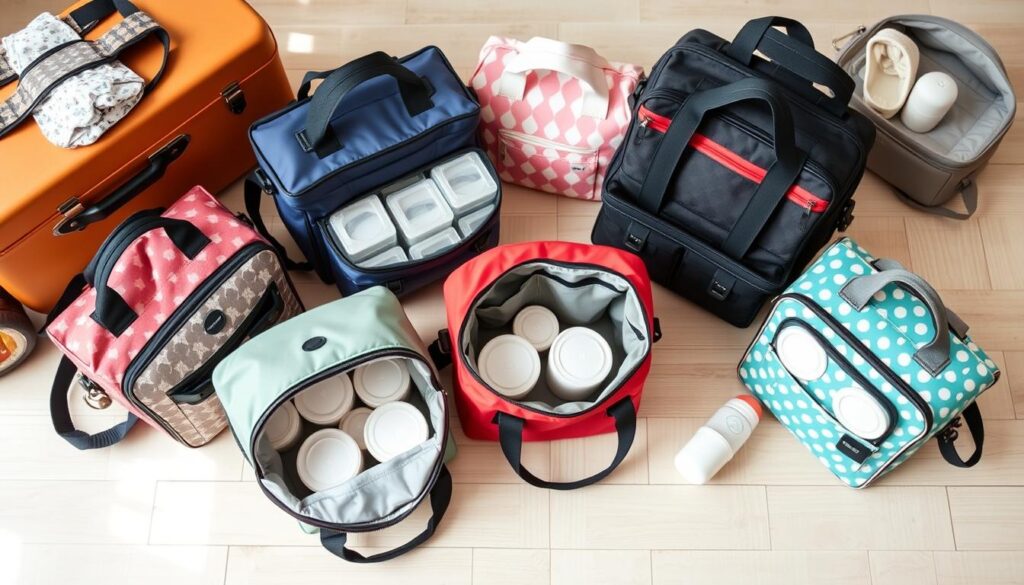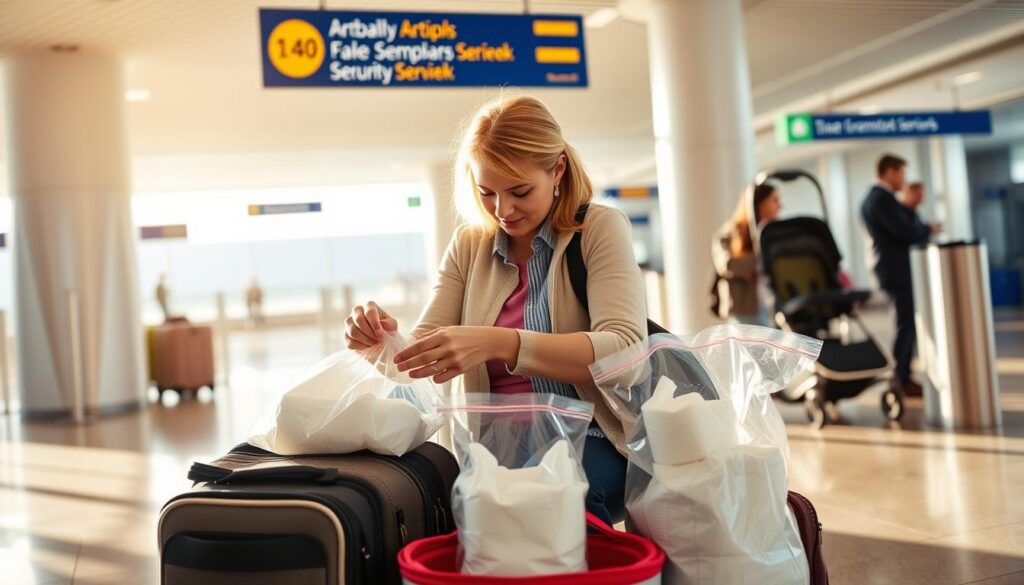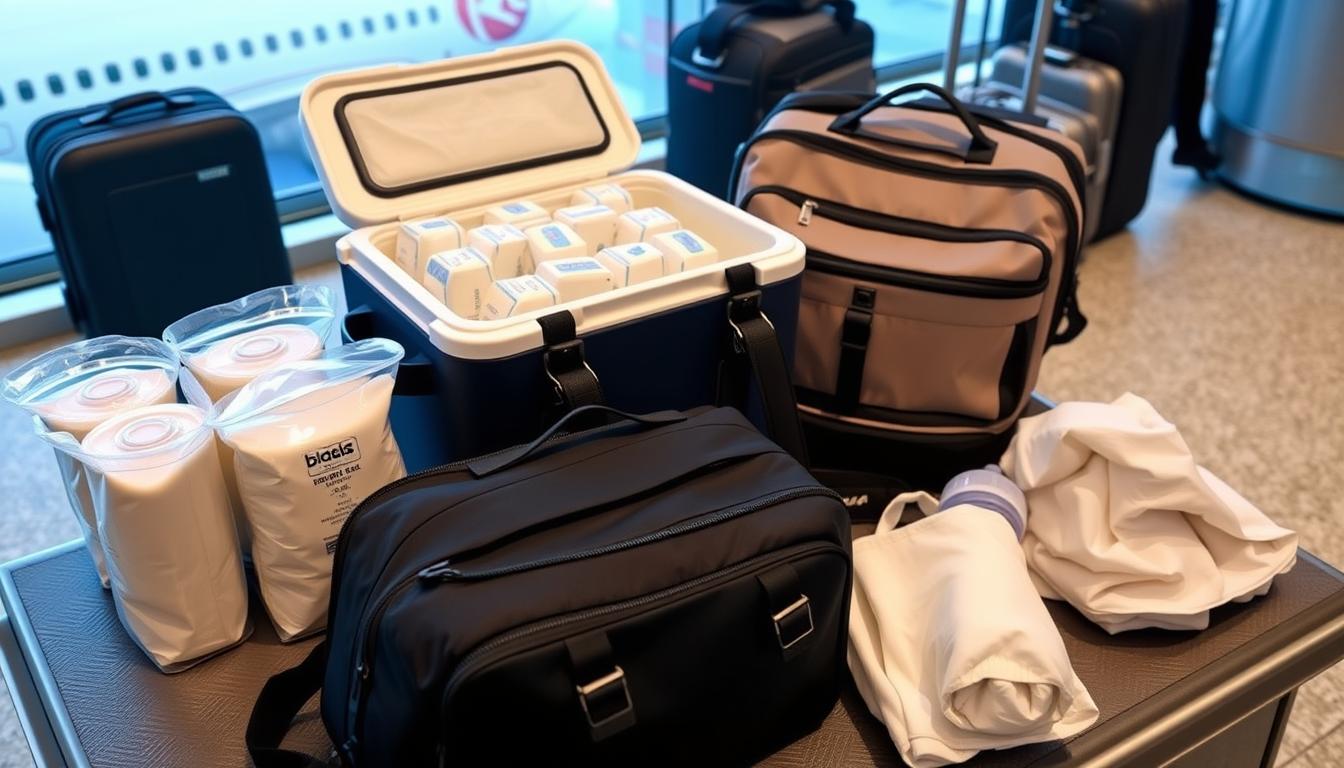Traveling with frozen breast milk can be tough for nursing moms. This guide makes it easier. It covers TSA rules, packing tips, and more. You’ll learn how to keep your milk safe and good while traveling.
Going on a trip, short or long, needs the right info. We’ll talk about the gear you need, keeping the right temperature, and what to do if your trip gets delayed. By the end, you’ll know how to keep your milk safe and sound.
Key Takeaways
- Learn TSA regulations for traveling with frozen breast milk
- Discover essential equipment for safe breast milk transportation
- Understand proper storage temperatures and time guidelines
- Explore packing strategies for different travel durations
- Find solutions for common challenges when traveling with frozen milk
Understanding TSA Rules and Regulations for Frozen Breast Milk
Traveling with frozen breast milk needs careful planning. You must know TSA rules to have a smooth trip. This is important for mothers flying with frozen breast milk in their carry-on.
Current TSA Policies for Breast Milk Transportation
The TSA sees breast milk as a medical liquid. This means you can carry more than 3.4 ounces in your carry-on. There’s no limit on how much breast milk you can bring.
Just remember to declare it at the security checkpoint. This makes things easier for everyone.
Documentation Requirements for Flying with Breast Milk
Carrying a doctor’s note or birth certificate can help. These documents show why you need breast milk. They are useful if you’re traveling without your child.
Security Screening Procedures for Frozen Milk
TSA officers might test your frozen breast milk for explosives. They use methods that don’t hurt the milk. They won’t open containers unless it’s really needed.
If more screening is needed, ask for a private area. This can make you feel more comfortable.
| Item | Carry-on Allowed | Quantity Limit | Special Instructions |
|---|---|---|---|
| Frozen Breast Milk | Yes | No limit | Declare at security |
| Ice Packs | Yes | Reasonable amount | Must be frozen solid |
| Breast Pump | Yes | One | Remove from bag for screening |
Knowing these TSA rules makes traveling easier. Always check the latest rules before you go. Policies can change.
Essential Equipment for Transporting Frozen Breast Milk
Traveling with frozen breast milk needs careful planning and the right gear. Moms must have reliable equipment to keep their milk cold. Let’s look at the must-have items for your journey.
Best Breast Milk Cooler Bags for Travel
Breast milk cooler bags are key for short trips. These bags keep milk cold for hours. Look for bags with thick insulation and leak-proof designs. Some top picks include:
- PackIt Freezable Breast Milk Cooler
- Medela Breast Milk Cooler Set
- Skip Hop Insulated Breastmilk Cooler Bag
Portable Freezer Options for Long Journeys
For long trips, a portable freezer is a good choice. These units plug into car outlets or wall sockets. They keep milk frozen for days. Popular choices are:
- Dometic CFX3 35 Portable Refrigerator and Freezer
- Alpicool C15 Portable Refrigerator
Ice Pack and Dry Ice Considerations
Ice packs are essential for any breast milk transport. For longer trips, dry ice is a game-changer. It keeps milk frozen for longer. When using dry ice, remember:
- Use protective gloves when handling
- Allow for proper ventilation
- Check airline regulations before flying
Proper equipment ensures your breast milk stays frozen and safe during travel. Planning ahead and choosing the right can make your trip stress-free and successful.

| Equipment | Best For | Duration |
|---|---|---|
| Cooler Bags | Short Trips | 4-6 hours |
| Portable Freezers | Long Journeys | Several days |
| Ice Packs | All Trips | Varies |
| Dry Ice | Extended Travel | Up to 24 hours |
How to Travel with Frozen Breast Milk: Step-by-Step Guide
Traveling with frozen breast milk needs careful planning. This guide has tips for traveling with breast milk.
Freeze your breast milk in small parts. Use bags made for breast milk and freeze them flat. This makes packing easier and thaws faster.
For flights, use an insulated cooler bag. Put ice packs at the bottom. Stack the frozen milk bags up, filling gaps with ice packs. Close the cooler tightly to keep it cold.
- Label each milk bag with the date and amount
- Pack a small cooler for use during the flight
- Bring extra storage bags and ice packs
- Inform TSA agents about your breast milk
At the airport, tell security about your breast milk. TSA lets you carry breast milk in your bag, even if it’s more than 3.4 ounces. Be ready for extra checks on your cooler and its stuff.
| Item | Carry-on | Checked Bag |
|---|---|---|
| Frozen Breast Milk | Allowed | Allowed |
| Ice Packs | Allowed | Allowed |
| Breast Pump | Allowed | Allowed |
On the flight, don’t open the cooler unless you must. If you need milk, use the small cooler you packed. When you arrive, put the milk in the freezer right away to keep it good.
Proper Storage Temperatures and Time Guidelines
When you travel, it’s key to keep breast milk frozen right. You need to know how to store it to keep it safe for your baby.
Maintaining Safe Temperature Ranges
Keep the milk at 0°F (-18°C) or colder. This keeps it frozen solid and good quality. Try not to let the temperature change too much.
Maximum Travel Duration Guidelines
Frozen breast milk can last up to 12 months. But for trips, use it within 6 months for the best taste. Use the oldest milk first on your trip. If it thaws, use it in 24 hours.
Temperature Monitoring Tools
Use tools to check the milk’s temperature. Digital thermometers for coolers are good. Some insulated bags have thermometers too. For long trips, think about data loggers that track temperature.
| Storage Method | Temperature Range | Maximum Duration |
|---|---|---|
| Deep Freeze | 0°F (-18°C) or lower | 6-12 months |
| Insulated Cooler | 0°F to 5°F (-18°C to -15°C) | 24 hours |
| Refrigerator | 39°F (4°C) | 5 days |
Packing Strategies for Different Travel Durations
When packing frozen breast milk for flights, think about how long you’ll be gone. For short trips, a simple cooler bag works well. But for longer trips, you’ll need more planning and special gear.
- Use an insulated cooler bag
- Pack frozen gel packs
- Store milk in leak-proof containers
- Bring extra Ziploc bags for security checks
For longer trips or international flights:
- Invest in a high-quality, durable cooler
- Consider dry ice for extended cooling
- Use a portable freezer for multi-day trips
- Pack a thermometer to monitor milk temperature
Make your cooler work for you. Put frozen items at the bottom and less frozen ones on top. This keeps everything cool during your trip.
| Trip Duration | Recommended Accessories | Packing Tips |
|---|---|---|
| 1-4 hours | Insulated cooler bag, ice packs | Pre-freeze milk, use double-sealed bags |
| 4-8 hours | Hard-sided cooler, frozen gel packs | Layer items, place thermometer inside |
| 8+ hours | Portable freezer, dry ice | Pack extra batteries, use insulated dividers |
Always check with your airline before you go. They might have special rules for breast milk and travel gear. With the right plan and gear, you can keep your milk safe on your trip.
International Travel Considerations with Breast Milk
Traveling with frozen breast milk abroad needs careful planning. You must know the rules of each country, what to declare at customs, and how to use your pumping equipment in different places.
Country-Specific Regulations
Every country has its own rules for bringing breast milk. Some let you carry only a certain amount. Others might ask for special papers. Always check the rules of your destination before you fly.

Customs Declaration Requirements
Always tell customs you have frozen breast milk. Use clear, sealed bags for it and keep it away from other liquids. Be ready to explain why you have it and show any needed papers to customs.
Voltage Differences for Pumping Equipment
If you plan to pump while traveling, think about the voltage in other countries. Many pumps need specific voltages. You might need a converter or adapter. Make sure your pump works in foreign places by checking its voltage and packing the right stuff.
- Research your destination’s electrical outlets
- Bring a universal adapter for your pump
- Consider a battery-powered pump for convenience
Knowing these tips will help you travel with frozen breast milk safely. Stay flexible and have a plan B for any surprises. These tips will make your journey easier when traveling with frozen breast milk.
Tips for Managing Frozen Breast Milk During Travel Delays
Travel delays can be stressful, even when you’re carrying frozen breast milk. It’s important to plan ahead. Here are some tips for managing unexpected situations.
Emergency Storage Solutions
When delays happen, finding a place to store your milk is key. Many airports have nursing rooms with fridges. If not, ask at information desks or restaurants if they can help.
Hotel Accommodation Strategies
If you need to stay overnight, pick a hotel with in-room fridges. Call them first to make sure they have one. Some hotels will give you a mini-fridge if you ask.
Don’t forget to pack a thermometer. It helps keep the milk at the right temperature.
Backup Plans for Extended Delays
For longer delays, consider these options:
- Look for a nearby pharmacy or grocery store to buy dry ice
- Find a local milk bank that might store your milk temporarily
- Use a portable travel freezer for extra protection
Remember, keeping breast milk safe while traveling needs flexibility and planning. With these tips, you can handle delays and keep your milk safe for your baby.
Common Challenges and Solutions When Traveling with Frozen Milk
Traveling with frozen breast milk can be tricky. But, with the right tips, you can overcome common hurdles. Leakage is a big worry for many moms. To stop spills, double-bag your milk and use leak-proof bags.
Place these bags in a cooler with ice packs. This keeps them frozen solid.
Security checkpoints can stress you out. But, be ready by telling TSA agents about your milk. Most know the rules, but bring TSA guidelines if needed.
Remember, breast milk doesn’t count as a liquid. So, you don’t have to worry about volume limits.
Managing your milk supply on the go is hard. Pump extra before you leave and find pump-friendly spots at your destination. If you’re worried, bring a manual pump as a backup.
This can save you during delays or when you can’t find a private spot for an electric pump.
Anticipating these issues helps you handle them better. With good planning and the right gear, you can travel with your frozen breast milk. This ensures your baby gets the nutrition they need, even when you’re away.


